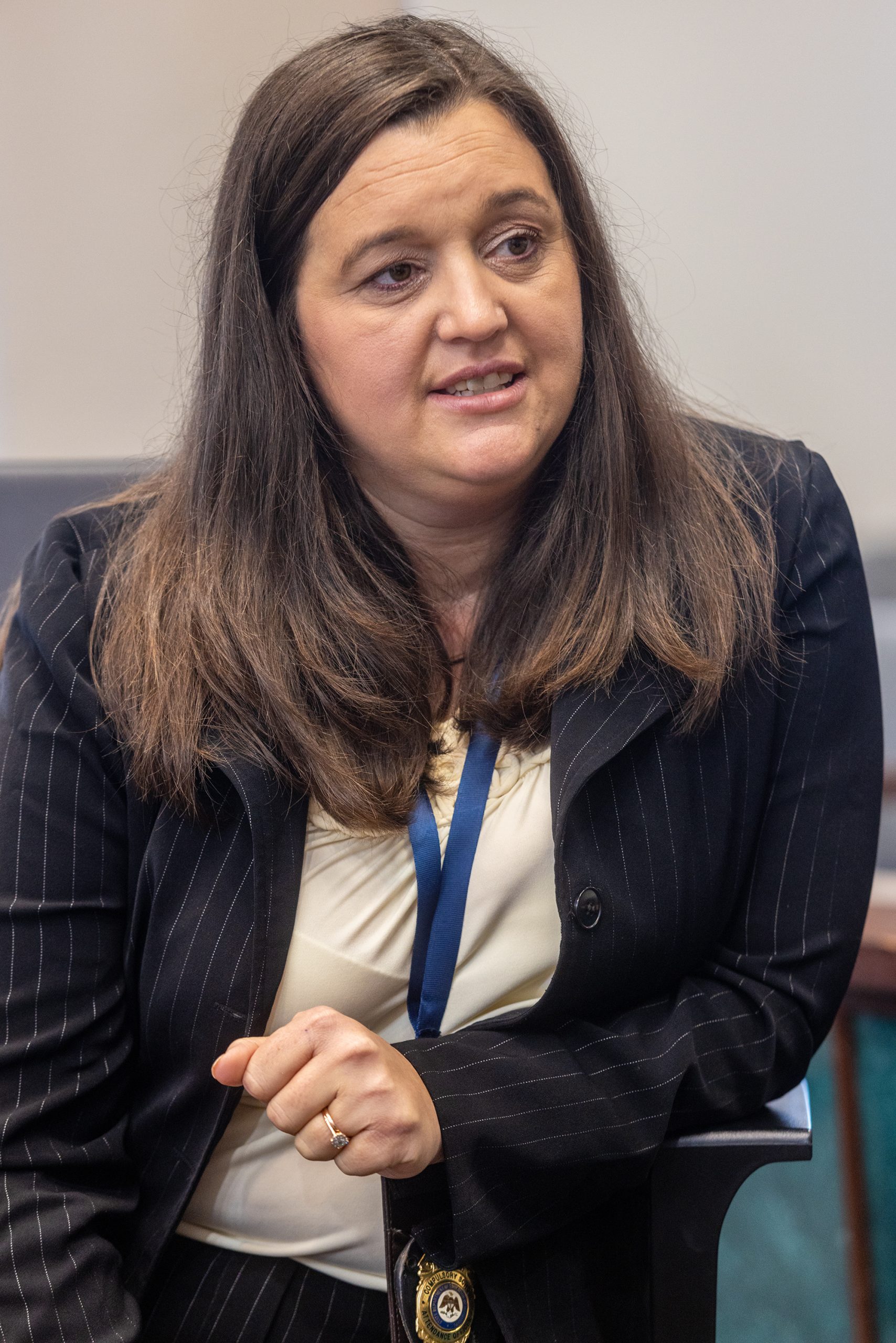Mississippi Today
State truancy officers face stagnant pay and ‘unmanageable caseloads’

State truancy officers face stagnant pay and ‘unmanageable caseloads'
Alison Lanthrip, a school attendance officer for Webster County, was puzzled when a particular student stopped showing up to school last year.
She wasn't the typical student to end up on a truancy list. Lanthrip could have sent a letter to her parents and continued through the tall stack of referrals on her desk. Instead, Lanthrip visited the home in person.
When she got there, Lanthrip found that the family's washing machine had stopped working. The student had gone through all her clean clothes.
“And she didn't want to come to school with dirty clothes,” Lanthrip said.
Lanthrip connected the family to a local service organization who replaced the washer. “She was in school within a week,” Lanthrip said.
This is how the often overlooked Office of Compulsory School Attendance Enforcement, established to comply with state statute, should ideally function.
“Our job is to not just enforce that state law that says you have to come to school, but our job is to work with every agency to make sure that the child does have an opportunity,” said April Brewer, the school attendance officer for Lamar County.
Sitting in a courtroom after bringing a truancy case before the local county court judge, Brewer clutched the intimidating gold metal and black leather attendance officer badge hanging around her neck, as if to hide it. She says she doesn't usually wear it on student visits. Brewer doesn't want them to think she's there to get anyone in trouble.
“I am there to really help and I really want them to open up because there are lots of reasons why you don't go to school and I really want to know what the reason is,” Brewer said.
But lately, the office has been in disarray as the workers have been experiencing higher workloads and stagnant pay, according to several school attendance officers who spoke with Mississippi Today.
The Mississippi Department of Education, which oversees school attendance enforcement, has systematically understaffed the office, they said, creating unmanageable caseloads, as high as 10,000 students per officer in some counties.
“When you are basically considered a paper pusher, you can't get in and counsel these students,” Lanthrip said. “… All you have time for is paperwork.”
Lanthrip and Brewer are part of a coalition of school attendance officers who are organizing with the help of the Mississippi Alliance of State Employees workers union to lobby and introduce legislation this coming year for better conditions in their office.
Until recently, MDE hadn't even been providing paper, ink and stamps in order to send the required letters, they said, forcing the officers to pay out of pocket for materials. Because of the conditions, there is too much turnover, contributing to the understaffing. Officers also said MDE has failed to approve their travel and mileage reimbursement, discouraging them from making home visits.
“If you're not able to do that and get in those households like that, you don't know what resources they need to try to help these families,” Lanthrip said.
And some haven't received a pay raise in over a decade.
Terri Hill from Jones County has been working as a school attendance officer for 26 years. After taxes, she takes home about $28,000. She said her last raise was about 15 years ago.
“It's ridiculous and everybody looks over us,” Hill said.
Brewer, a mom of 7, has been at the job for 11 years, but with a $30,000 salary, she's had to consistently work two additional jobs.
The bill they drafted would raise baseline pay by about 70%, bringing the floor up from $24,500 to $41,500 – exactly the current starting pay for public school teachers in the state. The 2023 legislation does not yet have a sponsor, but they say at least four lawmakers have expressed interest.
School attendance officers must have at least a bachelor's degree and their salaries are set in statute. After 17 years, an officer with a bachelor's degree can earn $31,182. With a master's degree, they can start out making $26,000 and cap out at $37,000 after 21 years. These state workers were left out of the realignments and teacher pay raises that the Legislature has passed in recent years.
Mississippi Department of Education officials denied that the department has deprived the officers of resources, but acknowledged concerns about the stagnant pay.
“We'll keep working at it to make sure that we hear the voices of our attendance officers to try to address their needs and work alongside our districts to make sure that if there are things there that help our school attendance officers better serve students, then that is 100% what we're focused on,” Kim Benton, interim state superintendent of education, told Mississippi Today.
Hill estimates she's responsible for overseeing between 4,000 to 5,000 students.
“It makes you just wanna pick up your purse and clock out and go home,” Hill said. “… The workload has increased, as far as getting referrals. Like in our county, Jones County, we used to have four PIN numbers (budgeted positions) and they took one away from us, so now there's only three of us working this county instead of four.”
At one point, there was a cap in the law that allowed for caseloads of no more than 2,500 students per attendance officer. But lawmakers removed that requirement when they rewrote the law in 1998. Now, MDE is authorized to employ a set number of 153 attendance officers. The state currently has 125 filled positions and 20 vacancies, Mississippi Department of Education told Mississippi Today.
The proposed new legislation would remove the limit on attendance officers and reinstate a student-officer ratio of no more than 2,000 students to one officer.
The officers are supposed to make contact with students after 5, 10 and 12 unexcused absences. At 12, the officer may choose to petition the court. These cases are handled differently across the state. Some counties utilize the county and youth courts while others take the cases to justice court, where the parents can face fines or even jail time in severe scenarios.
Lamar County Court Judge Brad Touchstone, a former lawmaker, said he aims to take the less punitive route and uses court hearings oftentimes to check in on the progress of students far after their initial truancy. He said school attendance officers like Brewer play a critical role in child welfare.
“They're another layer of protection that we have out there to identify kids that are in crisis. I've had children come in here that, at first blush, you just think they don't want to go to school, but then you identify there's a lot deeper issues there, depression, a whole host of issues that we need to know about,” Touchtone said. “And we don't always get a CPS report every time there's a kid in crisis. So April is able to sometimes identify these kids so we can put services in the home to address the real root problem, which is not truancy. It's that the child's in crisis.”
Just recently, Touchstone had a case where the student on his docket brought her school-aged friend to support her during the hearing. Touchstone recognized that if the second girl was there in court during the school day, she was absent, too. The court eventually identified the girl as a runaway from a foster family and “were able to secure her and get her back where she needed to be,” Touchstone said.
Last year, one of the schools Brewer covers called her to tell her that one of the students she had been working with – “she had been doing so well,” Brewer said – had not shown up to school.
Brewer went out to the home to find that the family's electricity had been cut off. The mom had lost her job and didn't seek help, fearful that she would have Child Protection Services called.
“She was scared that that would make them take the children into custody. And I said, ‘No.' I said, ‘We're here to help you. I will help you,'” Brewer said.
After some dead ends, Brewer found an agency that would pay to return power to the home.
“Now what if I didn't go out and do the home visit?” she asked.
When kids went virtual during the pandemic, it only increased the challenges for attendance officers.
“Because of the pandemic in 2020, thousands of children across the state did not return to school resulting in an exceptionally large number of “missing children,'” the officers said in a letter to lawmakers in support of two bills during the 2022 legislative session. “SAO's (school attendance officers) spent many hours, on top of their regular duties, to locate these children and ensure they were enrolled in school and receive an education.”
One of the bills would have raised attendance officer pay in statute, while the other would have removed the officers from MDE, placing them at the individual school districts.
Both died last session after receiving little attention. The chairmen of the house and senate education committees did not respond to Mississippi Today's request for comment.
For Brewer, who spent her youth in foster care, the work is especially personal.
“This is not just a job to me,” Brewer said. “I come from a very rough background with foster care and everything. I learned when I was about 14 or 15 that education was my way out. I see this job as an opportunity to reach kids that were basically me.”
“I try to be for them what somebody should have been for me,” she said.
This article first appeared on Mississippi Today and is republished here under a Creative Commons license.
Mississippi Today
Medicaid expansion negotiators still far apart after first public meeting
Kevin Blackwell, the main Senate negotiator trying to reach agreement on expanding Medicaid to provide health insurance for primarily the working poor, urged his House counterparts Tuesday to accept the Senate's scaled-down version of Medicaid expansion.
“Both chambers are off the porch” in terms of passing bills to expand Medicaid, Blackwell said. “… Both have taken a step forward. But if your position is my way or the highway, it is going to put us right back on the porch.”
House negotiators, meanwhile, offered a compromise expansion plan to the Senate on Tuesday, but Blackwell and his Senate negotiators did not reciprocate, saying only they would take the House counter back to Lt. Gov. Delbert Hosemann and other Senate leaders for consideration and casting doubt that they can gin up more Senate support.
Blackwell made his warning Tuesday near the end of the first open-to-the-public conference committee meeting, which was packed to capacity with onlookers eager to witness a key meeting of the Legislature's first-ever earnest debate of Medicaid expansion.
The issue has become the major focus of a contentious 2024 legislative session, with hundreds of Mississippians, top state business leaders, health officials and even religious leaders publicly advocating at the Capitol for full Medicaid expansion that stands to significantly help the poorest, unhealthiest state in the nation.
In the meeting on Tuesday, three House negotiators and three Senate negotiators met to try to hash out the differences between the two chambers on expanding Medicaid as is allowed by federal law and covered largely with federal funding.
House Medicaid Chairwoman Missy McGee, the lead House negotiator, said her chamber's goal is to expand Medicaid to cover the maximum number of poor Mississippians allowed under federal law and to draw down the maximum amount of federal dollars.
READ MORE: Experts analyze House, Senate Medicaid expansion proposals, offer compromise plan
She said the Senate plan did not do that. The House would expand Medicaid to cover those earning up to 138% of the federal poverty level or about $20,000 annually for an individual.
The Senate plan would cover those earning less than 100% of the federal poverty level or about $15,000 annually for an individual. McGee pointed out under the Senate plan there would be much less federal money available to pay for expansion. She said the goal should be to cover as many people as possible at the most affordable cost. She said the House plan does that.
But as a compromise, she offered “a hybrid plan” where those earning between 100% and 138% of the federal poverty level would receive health care coverage through private health insurance policies offered on the federal exchange. The costs of the policies, though, would be covered through federal-state Medicaid funds. But under the plan, the federal government would pay 90% of the costs.
Under the Senate plan, the federal government would pay 77% of the costs.
McGee said the House is offering the compromise to cover people through private insurance after Senate leaders said expanding Medicaid to 138% of the federal poverty level would damage the marketplace in Mississippi by moving people from the marketplace to Medicaid. While senators said they did not want to damage the marketplace, in reality, the marketplace provides polices for people earning much more than 138% of the poverty level and exchanges in the 40 states that have expanded Medicaid have not been harmed.
After McGee and the two other House negotiators offered the “hybrid plan” as a compromise, she urged Blackwell and his two Senate colleagues to take the proposal back to Senate colleagues and to come back in the coming days to possibly offer a counterproposal.
“We feel this is a major compromise,” she said.
As the meeting ended, Senate conferees said they would take the House's proposed compromise back to Hosemann and other Senate leadership. They urged McGee to also go back and talk with the House speaker and leadership.
“But if your position has not changed, or you haven't offered anything, then I don't have anything to take back,” McGee responded.

Blackwell said the Senate wanted to take slow steps while the House was moving forward with “a Ferrari plan.”
He said he does not believe the Senate would agree to such rapid movement after the two chambers had refused for the past decade to even consider Medicaid expansion.
Blackwell said that in other states, the number of people insured through Medicaid expansion and the costs have come in higher than initially estimated.
When asked after the meeting if he could point to any other state that had seen a great detrimental effect — financially or otherwise — from Medicaid expansion, he paused for a moment.
“I can't answer that,” Blackwell said. “I'm not in those other states,” although he said he met a lawmaker from Kentucky who told him the program had been expensive.
If the House would accept the Senate proposal, Blackwell said in the coming years the two chambers could work to expand upon it.
The first full conference committee on the pivotal issue occurred less than a week before the deadline for the conference committee to reach an agreement to offer to the two chambers for possible passage during the scheduled final week of the 2024 session.
McGee pointed out 40 other states, many governed by Republicans, have expanded Medicaid and none of those have tried to repeal the program. Blackwell argued that the expansion has cost more in those states than initial studies said it would cost.
McGee said the House plan had a four-year “repealer” and would be cost neutral through that time, according to various studies, which also indicate little or no cost to the state after those initial four years. After those four years, the two chambers would have to vote to continue the program or it would be repealed.
“It is almost as if we have a four-year pilot program paid for by the federal government,” McGee said.
But Blackwell warned that if the Legislature is unable to pass any version of expansion this year, he did not believe it would be possible in upcoming years.
“If it dies this year, it gets harder next and then it becomes almost impossible after that,” Blackwell predicted.
The two sides also at odds on other issues. For instance, the Senate does not want to expand Medicaid if the federal government will not allow a work requirement.
READ MORE: Top Mississippi business leaders endorse full Medicaid expansion
This article first appeared on Mississippi Today and is republished here under a Creative Commons license.
Mississippi Today
Former, incoming heads of state chamber, other business leaders endorse full Medicaid expansion
A delegation of major business leaders, including the incoming president of the state's chamber of commerce and the former commander of the Mississippi National Guard, pleaded with lawmakers on Tuesday to not adjourn their session without passing a bill that fully expands Medicaid coverage to the state's poorest citizens.
Jack Reed Jr. the former Republican mayor of Tupelo and the owner of Tupelo-based Reed's Department Store, spoke on behalf of the business leaders at the state Capitol, where he urged lawmakers to support expansion because of the positive financial impact it would have on the state's economy.
“It's the right thing to do morally,” Reed said of expansion. “Legislators, by virtue of your offices, you are in a position to make it happen. We Mississippi businesses are supporting you.”
Reed, former chairman of the Mississippi Economic Council and leader of the store that's been an anchor of north Mississippi for over a century, and his family have a storied history of advocating causes that are now considered visionary but were not politically expedient at the time.
Reed's father, Jack Reed Sr., served as the MEC president in the early 60s when he used his position to urge state leaders to keep public schools open and comply with court-ordered integration.
The elder Reed unsuccessfully ran as the Republican nominee for governor in 1987, was the inaugural chairman of the State Board of Education and was an early voice to call for state politicians to change Mississippi's former state flag that featured a Confederate battle emblem.
Scores of medical and faith leaders have spent weeks at the Capitol advocating for lawmakers to compromise on a plan that expands Medicaid coverage under the federal Affordable Care Act to 138% of the federal poverty level and draws down the full 90% matching rate from the federal government.
But Tuesday was the first time business leaders have openly spoken out about Medicaid expansion. The MEC, the Mississippi Manufacturers Association and the Business and Industry Political Education Committee have also tacitly endorsed expansion.
Both chambers of the Legislature have passed plans that expand Medicaid coverage to more Mississippians, but the proposals are drastically different.
The House's expansion plan aims to expand health care coverage to upwards of 200,000 Mississippians, and accept $1 billion a year in federal money to cover it, as most other states have done.
The Senate, on the other hand, wants a more restrictive program, to expand Medicaid to cover around 40,000 people, turn down the federal money, and require proof that recipients are working at least 30 hours a week.
Around 10 business leaders also wrote letters to state leaders on Tuesday, the majority of whom backed the House proposal to expand Medicaid to more Mississippians and draw the full match from the federal government.
Pat Thomasson, CEO of Philadelphia-based Thomasson Company, is the incoming MEC chairwoman, and she penned a letter to Republican Lt. Gov. Delbert Hosemann, House Speaker Jason White and Republican Gov. Tate Reeves on Tuesday urging them to support expansion.
“By covering the working poor and accepting the 90% federal match, plus the $700 million incentive program that would fully pay for the program for the first four years, we will have a healthier Mississippi and a better state economy,” Thomasson wrote.
B & B Concrete CEO David Brevard, CREATE Foundation President Mike Clayborne, Renasant Bank Board Chairman Robin McGraw, Montgomery Enterprises CEO Luke Montgomery, The Taylor Group CEO Lex Taylor, Community Development Foundation CEO David Rumbarger and MINTACT CEO Augustus Collins all wrote letters to state leaders supporting expansion.
Retired Maj. Gen. Collins is also the former adjutant general of Mississippi and was commander of the Mississippi Army and Air National Guard under former Republican Gov. Phil Bryant. He wrote a letter to Hosemann urging Medicaid expansion.
“Many rural hospitals are suffering and are on the verge of closure,” Collins wrote. “This expansion has the ability to save these hospitals … Mississippi has delayed far too long. The time is now.”
The Tuesday event happened hours before a group of House and Senate negotiators were scheduled to meet at the Capitol to haggle out a compromise on the different expansion plans.
Speaker White previously told Mississippi Today he was open to adopting a hybrid model of expansion that uses both public and private options to cover additional people. But it's unclear if a majority of Republican senators would agree to a plan that fully expands Medicaid.
Reed told Mississippi Today that he would encourage state senators who are on the fence about supporting full expansion to think about their legacy and consider the full picture of the economic and medical risks at stake for Mississippi, one of the unhealthiest states in the nation.
“There comes a time in every legislator's life when he or she has the opportunity to really do something that makes a difference to thousands of their fellow Mississippians,” Reed said. “This is one of those times.”
This article first appeared on Mississippi Today and is republished here under a Creative Commons license.
Mississippi Today
‘A little bit of blood’: Mississippi tech company settles welfare scandal suit
Ricky Junco was working a low-wage, e-commerce job at Goodwill and volunteering to teach Microsoft Word to kids at a youth detention center in 2018 when he met Vince Jordan, founder of a local tech startup.
Junco had been looking for ways to strengthen his skills to secure better employment. And Jordan had the solution: a virtual reality programming academy offered by his company, Lobaki. Junco said he was reluctant at first, doubting he'd be able to afford the courses. That's when Jordan explained he could attend free of charge.
Lobaki's foundation had recently — and suddenly — received a large grant from the state's welfare department, Mississippi Department of Human Services, to offer the classes.
The money didn't come directly from the state agency, but through a contract with a private entity called Families First for Mississippi, which auditors and prosecutors say facilitated a multimillion dollar fraud scheme between 2016 to 2019.
Junco started training at the academy in the evenings. First, he learned how to design a graphic triangle, then make it 3D, then give it texture, then make it look like concrete, and so on.
Junco and his classmates, some of whom he said were transitioning out of prison, were learning how to design and build “experiences” — the term that describes the immersive worlds that appear inside virtual reality headsets. Junco's goal was to create a simulation of a welding gun, then the experience of welding at a tall height.
“A big challenge in the oil rig right now is that they'll spend time training somebody to be a welder, and then they ask her to go on top of the rig, and they find out that she's hesitant about heights,” Junco said. “So therein lies one of the examples of the value of immersive technology is that you can replicate these things and identify fears and defeat fears as well.”
These programming skills could translate to the entertainment industry, such as animation in video games or movies, or to virtual education and vocational training, such as programs to teach someone how to drive a forklift.
Before its demise, Families First touted its VR capabilities in preparing people for the workforce, though it's unclear how much of that kind of training actually took place.
Faster than it began, the welfare-meets-silicon valley experiment was over.
In June of 2019, Lobaki President Kevin Loud said three women whose names and titles he couldn't remember visited the tech company's office and pulled Lobaki's chief operating officer aside.
“She came out with this amazed look on her face, and she says, ‘We gotta be out of here by the end of the week,'” Loud said.
The state auditor had begun investigating widespread misspending and theft within the state's welfare program after receiving a tip from inside the agency. MDHS seized all of the VR equipment Lobaki purchased under the grant, including two expensive harness stations, devices similar to treadmills used for immersive gaming — a seemingly bizarre purchase for a state welfare office.
Lobaki would soon find itself at the center of one of the biggest scandals in state history. The tech startup was lumped with dozens of other alleged fraudsters and accused of robbing the poorest citizens of the poorest state in the country.
“We felt it was completely unjust and we tried to position ourselves as best as possible, but it was like a wave that just kept coming in on you, you know?” Loud said.
The former state welfare agency director and directors of both nonprofits in charge of Families First pleaded guilty to federal criminal charges — some of which relate to the Lobaki contract — in 2022 and 2023 and are awaiting sentencing.

But to Junco, Lobaki's function with the welfare agency was the embodiment of the popular “hand up, not a hand out” philosophy. Though Junco and his classmates did not have to be low-income to participate, Junco said that he and plenty of others were, in fact, just the kind of people MDHS purports to serve.
“As a result of that exposure, it did lead to a better lifestyle for me later on,” Junco said. “Because I learned something and it segued to a job opportunity as well. Which is, in my opinion, the classic example of what programs like this should look like.”
After the investigation began, Junco returned to class one night to find the doors locked. He walked down the stairs to another level of the building and peered through the windows of a vacant room where the VR equipment was stashed haphazardly. MDHS owned the gadgets, but the agency didn't have a use for them, so they would continue collecting dust for years. MDHS eventually disposed of the equipment by sending it to the Mississippi Office of Surplus Property, which sells the public's unused or confiscated items. MDHS did not answer Mississippi Today's questions about when this occurred, how much money it may have recouped from any sales, or if those proceeds will be transferred back to the welfare program.
Though Junco said he never received a certificate from Lobaki's VR academy due to the fallout, the company later hired him to teach programming classes at the Jackson Medical Mall. He now serves as Lobaki's director of business development. A handful of other employees at the roughly 15-person firm also came from the academy.
Lobaki told auditors that it graduated a total of 60 students at a cost of $13,250 per student. The academy was not an accredited program, but Loud said students took with them design portfolios they could use to entice employers. Student outcomes weren't well documented. Besides the participants Lobaki hired, one of which eventually left to work for Meta, formerly known as Facebook, Lobaki is aware of two other students who secured jobs in the field, plus one who went back to college and another who entered the military for computer science.

This lack of data collection isn't unusual: the welfare grant Lobaki operated the academy under is notorious for involving no metrics for tracking program performance.
The public funds Lobaki received came from the federal safety net program called Temporary Assistance for Needy Families, or “TANF,” which is known for providing monthly cash assistance, or “welfare checks,” to very poor families. But Mississippi only uses 5% of the funds this way. States may also use the block grant to “end the dependence of needy parents on government benefits” through workforce development.
Lawyers working to recoup misspent TANF funds for the state argued that Lobaki received the grant through fraudulent transfers, that its program did not align with a lawful TANF purpose, especially since its participants were not necessarily needy, and that it must return $795,000 to the state.
After waging a legal battle for nearly two years, MDHS and Lobaki recently reached a settlement. Lobaki paid MDHS $10,000 on April 15 and the next day, the judge dismissed charges against the company. Lobaki agreed to pay back a total of $300,000 by 2028, which could be reduced to $240,000 if it pays earlier. In the agreement, Lobaki maintained its denial of the allegations in the suit, saying it only settles “to buy their peace and avoid further cost of defense.”
In Lobaki's failed 2023 motion to dismiss the complaint against it, the company argued, among other things, that it never made any false statements or misrepresentations to procure the funds. Hinds County Circuit Court Judge Faye Peterson denied the motion and the Mississippi Supreme Court declined to take the case on appeal.
“We didn't know the difference between TANF and a frickin' turnip patch, you know?” Loud said.
But Lobaki's stated mission of providing unique training that underemployed Mississippians could use to take advantage of better, newly emerging job opportunities sounds like exactly the kind of thing that Mississippi's conservative welfare agency would support.
“We thought we were doing something good for society,” Loud said. “We thought we were doing it completely along the lines of state regulation.”
In fact, shortly after they launched the academy in downtown Jackson, Loud said he remembered receiving a visit from then-Gov. Phil Bryant, who appointed the now disgraced former director John Davis and oversaw the agency during the years of the scandal.
“He (Bryant) puts on the headsets, and he says, ‘This is exactly what we should be doing,' you know?” Loud said. “And when you see the governor of the state saying something like that, and then he says to John Davis, he says, ‘How much money are we giving these guys?' He says, ‘We've given them $635,000.' He (Bryant) goes, ‘Give them some more.' He (Davis) writes us a check for $160,000 that day.”
“So, I mean, how are you not going to think that you're not doing something in complete compliance with the state?” Loud added.
MDHS has not named Bryant as a defendant in the civil suit and he is not facing any criminal charges. Bryant's attorney declined to comment on the former governor's dealings with Lobaki. MDHS would not comment on the Lobaki settlement, telling Mississippi Today, “Due to the suppression order in the Civil Case, MDHS is unable to comment on the filing.”
Loud said Lobaki first got linked up with the welfare agency in 2018 after Davis read an Fox News article about its efforts to train students in Clarksdale, Mississippi, in video game development. “Virtual reality developers aim to spark tech boom in the Deep South,” the headline reads.
Unlike other defendants in the scandal, Loud noted that MDHS approached Lobaki, not the other way around.
“John Davis sees it, calls up Vince, comes up, tours it. He (Davis) says, ‘I love this, but I want you to do it in Jackson,'” Loud said. “‘You come to Jackson, we'll set up an academy. I got 58 career development centers across the state. We'll set these up in all 58 of them.'”
By this point, MDHS had begun pushing tens of millions of TANF funds to the two nonprofits running Families First for Mississippi. Technically, states may define “needy” however they want. For the types of services Families First provided, Mississippi had set the income threshold at 300% of the poverty line, so in 2018, a family of three could have earned $60,000 and still qualified for the program. But no one was checking. The state had written in official plans submitted to the federal government that the Families First centers “have strategically braided all available resources therefore eligibility requirements are waived for families and services are free of charge.”
This may have been moot anyway because according to emails and notes from a meeting between MDHS and another grantee, MDHS lawyers and Families First had adopted the theory that once the money hit the private nonprofits, the grantee was no longer bound by federal spending regulations.
Davis instructed the nonprofits running Families First to ink a one-year $635,000 contract with Lobaki to begin Sept. 1, 2018. This itself was a violation of federal regulations, according to the state auditor, because it flouted the competitive bid process. Also, according to contracting rules, once the government issues a contract to a private entity, it cannot then tell that entity with whom to enter subcontracts.
Davis had recently leased expensive offices for MDHS executive staff at a high rise in the middle of downtown Jackson called City Centre, where Lobaki was given space to set up shop. The academy, where students like Junco took classes, was located at the old state-owned building on State Street that previously housed MDHS and where Families First would soon be headquartered.

Family Resource Center of North Mississippi, the nonprofit running Families First in the northern part of the state, paid Lobaki the $635,000 in one lump sum payment at the start of the contract. In January of 2019, Gov. Bryant toured Lobaki, and Mississippi Community Education Center, the other Families First nonprofit, entered an additional contract with Lobaki for $160,000.
Loud said the first red flag surrounding Lobaki's relationship with MDHS came in early 2019 when Lobaki was seeking support from another state agency, the Mississippi Development Authority. MDA asked Lobaki for a copy of its office lease. It didn't have one. By June of 2019, the state was kicking Davis out of office and stripping Lobaki of its academy.
Bryant left office in January of 2020 and auditors office agents arrested Davis and Mississippi Community Education Center founder Nancy New in February of 2020. Loud said Davis' fall and the revelations around the funding devastated Jordan, Lobaki's founder, who eventually left the company to join a VR education consultancy in Florida.
Before that, though, Lobaki brought on Glenn McCullough, who had just left his post as director of MDA under Bryant, as a board member in March of 2020.
A couple months later, State Auditor Shad White released his single audit, which first questioned the payments to Lobaki “due to the known conflict of interest, and inability to determine if these contracts were reasonably priced due to lack of procurement and the lack of arms-length bargaining,” the audit reads.
Despite the audit finding, Gov. Tate Reeves distributed $800,000 in Governor's Emergency Education Relief (GEER) funds to Loabki for online learning in early 2021.
Later that year in October of 2021, independent forensic auditors commissioned by MDHS confirmed that the welfare payments to Lobaki were unallowable under federal regulations. The audit said the VR academy failed to align with federal TANF rules because it did not impose eligibility requirements on participants. But while the program violated federal rules, it did appear to adhere to the state's own rules since the state plan had suspended income requirements for Families First clients.
“The work performed by Lobaki Foundation appeared to align with its contractual obligations,” forensic auditors wrote.

After the forensic audit, White sent demands for repayment to more than two dozen people or companies, which he referred to the AG's office. Lobaki was not one of the entities White recommended for prosecution.
By April of 2022, Nancy New and her son Zach New were pleading guilty to charges of fraud against the government and wire fraud for the payments they made to the VR academy. Zach New admitted to paying $500,000 to construct a virtual reality center at the downtown high rise and disguising the payment as a “lease.” There is a strict prohibition on using TANF funds for brick and mortar construction.
Represented by outside counsel Brad Pigott, a former U.S. Attorney, MDHS filed its first civil suit in May of 2022, but the complaint did not name Lobaki. MDHS fired Pigott shortly after he filed the suit and replaced him with law firm Jones Walker, which filed the amended complaint that added Lobaki to the suit in December of 2022. McCullough left Lobaki shortly after that but maintains stock in the company, Loud said.
Loud said he's caught up with White since Lobaki's legal troubles began.
“I said, ‘Shad,' I said, ‘You recommended a lot of people over to the AG to be prosecuted. Why didn't you recommend Lobaki?' He said, very simply, he says, ‘Because you guys didn't do anything.' I said, ‘Well, thanks. Can you stop this litigation?'” Loud said with a laugh.
As White has stated repeatedly, the state auditor and his investigators are not prosecutors and do not determine who will be charged criminally or civilly.
“We did not serve a demand letter on Lobaki because the evidence we'd seen suggested they performed the services they were hired to perform,” White said in a statement to Mississippi Today. “It's similar to the newspapers that had been paid in welfare money to run ads, and then they ran those ads. Performing the service would possibly give a vendor a good faith vendor defense under the law, though the ultimate call about whether to sue anyone in this case who did not receive a demand is made by the attorneys representing the state, not us.”
The attorney general's office has partnered with MDHS's counsel on the civil suit, but Gov. Reeves has indicated that as the authority over MDHS, his office is leading the litigation and ultimately selected who to hold culpable.
Loud estimates Lobaki has spent $100,000 or $150,000 in legal fees. That's a lot for a young company like Lobaki, Loud said, whereas the state of Mississippi has seemingly unlimited resources, especially since it's dipping into its large TANF pot to pay for the lawsuit.
Since the state has tightened up spending in light of the scandal, it has amassed an unspent balance of $146 million in TANF as of 2022 — money that the state could direct towards fighting poverty. When Lobaki received the welfare grant in 2018, the state was serving roughly 4,500 families through the traditional cash assistance program and reported a TANF application approval rate of about 20%. Today, as the welfare civil suit enters its third year, MDHS is serving just 1,600 families and approves roughly 9% of monthly applicants, according to 2023 data.
“It's just kind of ironic that the attorneys opposing us are getting funded from TANF funds. And one of the things that they're accusing us of is using TANF funds incorrectly,” Loud said. “But the attorneys wrote the law, so the attorneys wrote that it was fine for them to get paid out of it.”
What's worse for the company, Loud believes Lobaki has lost roughly $8 million in work with entities who were turned off by its association with the TANF scandal. In 2023, Lobaki secured a $300,000 line item appropriation in Mississippi's K-12 budget proposal for a VR pilot program. Before state lawmakers passed the budget, they found the appropriation to Lobaki tucked away in the bill. No lawmaker would admit to making the addition and they removed it before passage.
Lobaki did, however, quietly receive $74,500 from the American Rescue Plan Act, the coronavirus pandemic relief fund, for a program with the Mississippi National Guard Youth ChalleNGe Academy in 2023.
The company also hired powerful lobbying firm Capital Resources in 2023 to lobby for VR funding on the federal level and offer public relations advice, but that contract has since ended. Lobaki's current lobbyist, according to the Secretary of State's Office, is Allan Cole.
Loud and the rest of the staff hope the recent settlement means Lobaki can begin repairing its reputation.
On April 15 after delivering the $10,000 check to MDHS, Loud said he ran into the agency's director Bob Anderson — a former unit director at the Attorney General's Office appointed by Reeves to run MDHS in 2020 — at Martin's restaurant, a popular lunch spot in downtown Jackson. They'd never met in person. Loud went up to the former prosecutor, stuck out his hand and introduced himself.
“I said, ‘I didn't think you could get blood out of a turnip, but you did a pretty damn good job,'” Loud said. “He said, ‘We just wanted a little bit of blood.'”
This article first appeared on Mississippi Today and is republished here under a Creative Commons license.
-
SuperTalk FM7 days ago
Chance of parole denied for man who killed 3 Choctaw Indian tribal members
-
SuperTalk FM6 days ago
2 arrested after missing man’s body found on side of Mississippi highway
-
Mississippi News5 days ago
What this means for local schools
-
228Sports3 days ago
From Heartbreak to Hoop Dreams: Pascagoula Panthers Springboard from Semifinal Setback to College Courts
-
Kaiser Health News7 days ago
To Stop Fentanyl Deaths in Philadelphia, Knocking on Doors and Handing Out Overdose Kits
-
Mississippi News3 days ago
2 dead, 6 hurt in shooting at Memphis, Tennessee block party: police
-
Mississippi News6 days ago
Willis Miller sentenced to 45 years in prison, mandatory
-
Mississippi News3 days ago
Forest landowners can apply for federal emergency loans


































